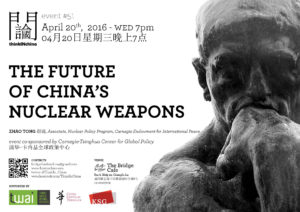

Speaker
ZHAO Tong, 赵通, Associate, Nuclear Policy Program, Carnegie Endowment for International Peace
ABSTRACT
“China’s nuclear modernization program has attracted wide international attention. The 2015 Victory Day parade saw China displaying new ballistic missile systems. Beijing is also reportedly developing new strategic missile programs and building a strategic nuclear submarine fleet. This presentation offers an overview of China’s nuclear principles and doctrine. It explains how the emergence of nuclear military technologies such as missile defense, conventional precision strike, space, and autonomous weapons presents new challenges for Beijing to maintain a credible nuclear second strike capability. It uses the example of China’s development of sea-based nuclear weapons to shed light on Beijing’s efforts to address such problems and to explain potential security implications for conventional military balance and escalation management. Professor Zhao will be more than happy to address questions and have a broad discussion on other related nuclear policy issues such as North Korea and the possible deployment of THAAD missile defense system in South Korea”.
This event is organized in partnership with:
Carnegie-Tsinghua Center for Global Policy – 清华-卡内基全球政策中心
The Carnegie–Tsinghua Center for Global Policy brings together leading policy experts and practitioners from China and around the world to engage in collaborative dialogue and research. From its platform at Tsinghua University, the center works to identify constructive solutions to common global challenges. The Carnegie–Tsinghua Center is also part of Carnegie’s well-established Asia Program, which provides clear and precise analysis to policy-makers on the economic, security, and political developments in the Asia-Pacific region.The Carnegie–Tsinghua Center works with Carnegie’s other global centers to host conferences, roundtables, seminars, and closed-door briefings and to publish timely and incisive analysis on the most pressing global issues, including international economics and trade; energy and climate change; nonproliferation and arms control; and security threats in North Korea, Iran, South Asia, and the Middle East. An advisory council composed of distinguished leaders from the policy, business, and academic communities in China provides the Carnegie–Tsinghua Center with advice and support.